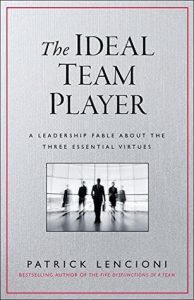The Power of 3 Values and Team Players
One of my favorite business authors is Patrick Lencioni. He forces you to think critically about your leadership skills, while teaching you core principles that will improve any business.
You might be familiar with some of Lencioni’s books: The Five Dysfunctions of a Team, Death by Meeting
, and The Advantage
(my top pick, and his only non-fiction book).
 His most recent book is The Ideal Team Player
His most recent book is The Ideal Team Player which outlines 3 critical qualities – or values – needed to be a great team player.
- Humble: this is best defined by a quote from CS Lewis, “Humility is not thinking less of yourself, it’s thinking of yourself less.” Lencioni suggests beware of the overtly arrogant.
- Hungry: as Lencioni states, “Hungry people almost never have to be pushed by a manager to work harder because they are self motivated and diligent.” He adds, if someone doesn’t have this, it’s hard to instill in others (especially later in life).
- Smart: this refers to someone’s common sense about people (or emotional intelligence). Lencioni says “this is everything to do with the ability to be interpersonally appropriate and aware.”
I was captivated when I listened to an interview with Lencioni on Donald Miller’s podcast. Here Lencioni outlines the backstory that led to this book.
Lencioni and His 3 Values
Years ago, while working for a software company, Lencioni and his team read Jim Collins’ book Built to Last, discovering the importance of core values (as I highlighted here). So Lencioni decided his team needed “some of these” and, after conducting an off-site meeting, arrived at 3 key values: Humble, Hungry, and Smart. At the time, he had no idea these would have a universal appeal to other leaders.
Later, after starting his own consulting firm, Lencioni decided to craft the culture of his new company around these same 3 values: Humble, Hungry, and Smart.
Surprisingly, when Lencioni and his team worked with clients to come up with core values (one of the consulting services they offered), the question would inevitably come up, “What are YOUR core values?” After revealing “Humble-Hungry-Smart”, Lencioni’s clients would say, “We’ll take those!”
 Lencioni acknowledges that one of the reasons these values resonated so well was because there were only 3 of them (as I often recommend). For Lencioni, limiting to 3 values was something he often heard stated by Ken Blanchard. And as Lencioni outlines in his book The Advantage, companies that have too many values often struggle to live by them – because nobody can remember them. In addition, it’s near impossible to find the right people because no one possesses all of these values.
Lencioni acknowledges that one of the reasons these values resonated so well was because there were only 3 of them (as I often recommend). For Lencioni, limiting to 3 values was something he often heard stated by Ken Blanchard. And as Lencioni outlines in his book The Advantage, companies that have too many values often struggle to live by them – because nobody can remember them. In addition, it’s near impossible to find the right people because no one possesses all of these values.
Now, when Lencioni’s clients wanted to adopt the same values he used in his company, he thought they were just being lazy. But later he realized there was a universal appeal to these specific values. These 3 values (or virtues) were the requirements to overcome The 5 Dysfunctions of a Team, which he had previously identified.
With the encouragement of others, Lencioni finally wrote a book about the 3 qualities of an ideal team player, making it a perfect addendum to his previous work on creating effective teams.
The Need for All 3
For someone to be a great team player, Lencioni states they need to posses ALL 3 of these traits: Humble-Hungry-Smart.
If someone is humble but not hungry, they may avoid the healthy conflict needed to move the team forward. If someone is hungry but not smart, they might make a huge impact but have no regard for the damage they’re doing to others. And if someone gets along great with others and is viewed as fun but has no interest in achieving team goals, then no one wins.
Does this mean leaders should fire folks who don’t score well on all 3 values? Here, Lencioni provides a brilliant response: coach them.
He encourages individuals on teams to “self rank” themselves, that is to rank order the 3 values on themselves, from the strongest to the weakest. This is a case where focusing on the weakest one actually has a benefit, as everyone can always improve. Managers then need to proactively help team members get better on their weakest area by highlighting lapses and holding them accountable
For example, if someone says their weakest trait of the 3 is being humble, because they always talk about themselves and rarely celebrate the success of others, their manger then needs to hold them accountable by calling them on it every time they mess up. Lencioni refers to this as “tough love” where the purpose is to help each individual get better, in a non-judgmental manner.
Lencioni states this approach drives one of two outcomes: people either get better, or they leave. Both are worthwhile.
Now, while the focus here is on identifying and coaching the ideal team player, I believe this approach works perfectly for ANY set of 3 values, especially when leaders have selected the right set of Differentiating Values.
Moving Beyond Teams
For many years now, I have been researching, writing, and consulting with clients about Differentiating Values. If you’ve been a reader of my articles for any time, you’ll know that I believe the number of core values for any organization needs to be limited to just 3 (maximum of 4).
You’ll also know that I continually encourage leaders to use their core values to:
- Set strategic direction
- Define expected behavior
- Build competitive differentiation
- Empower leaders to simplify and focus
Values are NOT just for great teams (which, by the way, is one of the 17 Common Values). Values are the foundation on which leaders build strong, healthy organizations that are resilient and lasting.
Values are also the tools leaders use to reward good decisions and behavior, and correct bad ones. Values are the benchmark to ensure alignment for everyone across an organization.
But the number of values must be limited (ideally 3). And everyone must be actively working on them, with the help of coach to keep them accountable.









